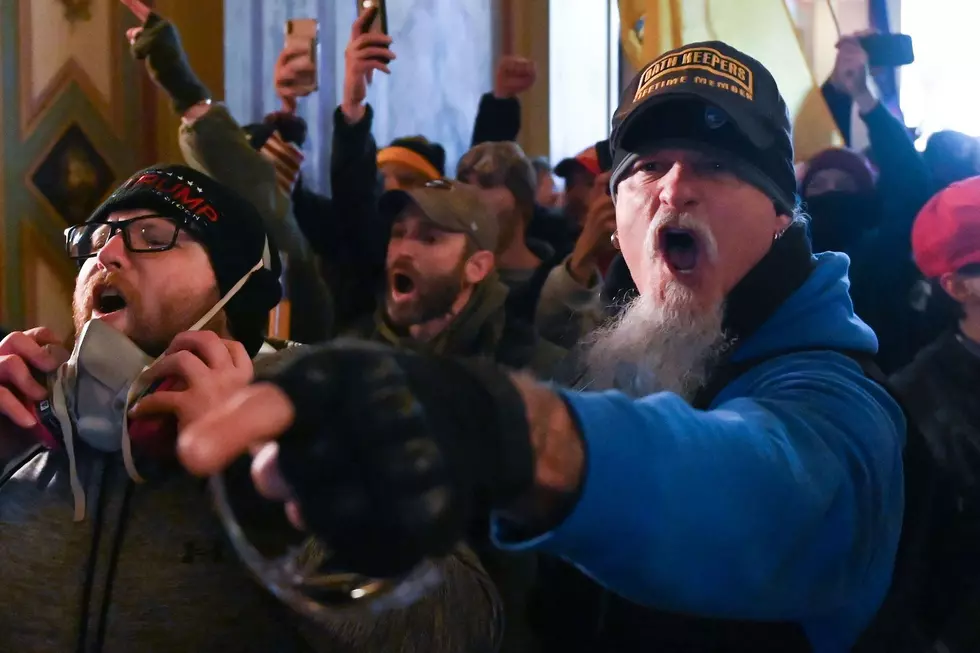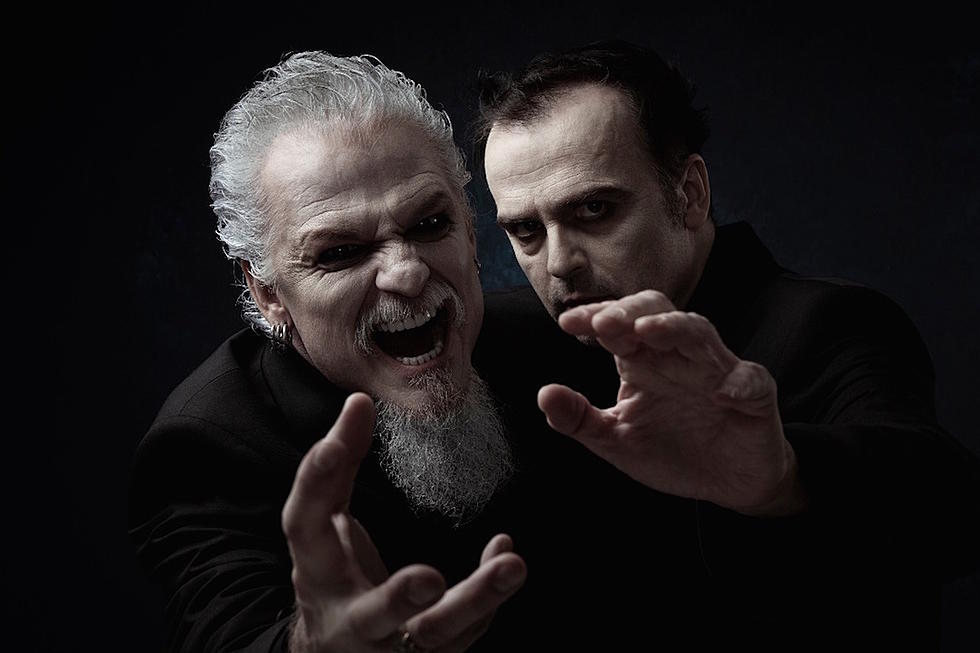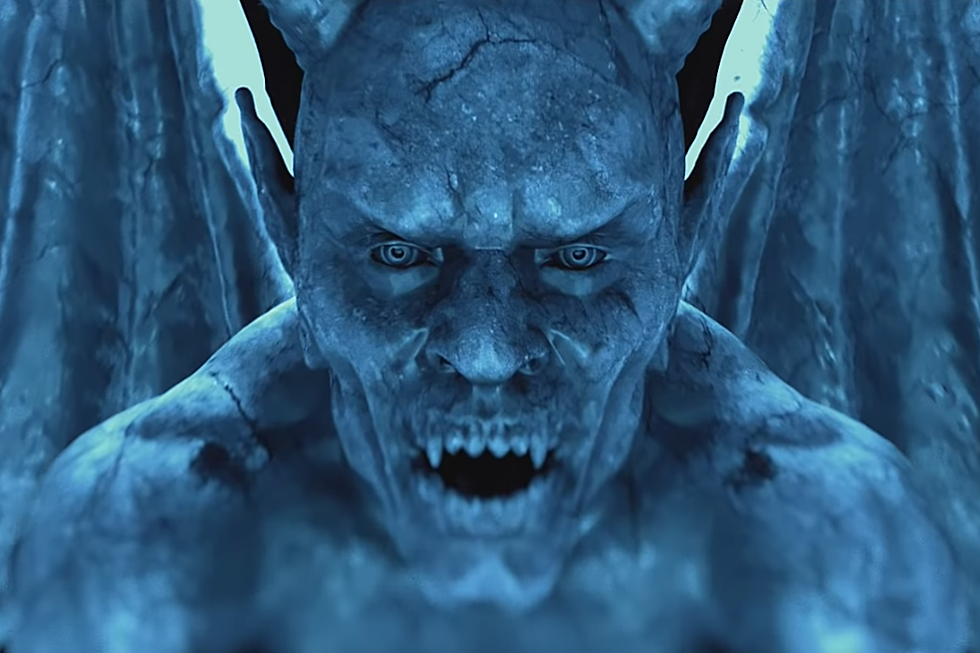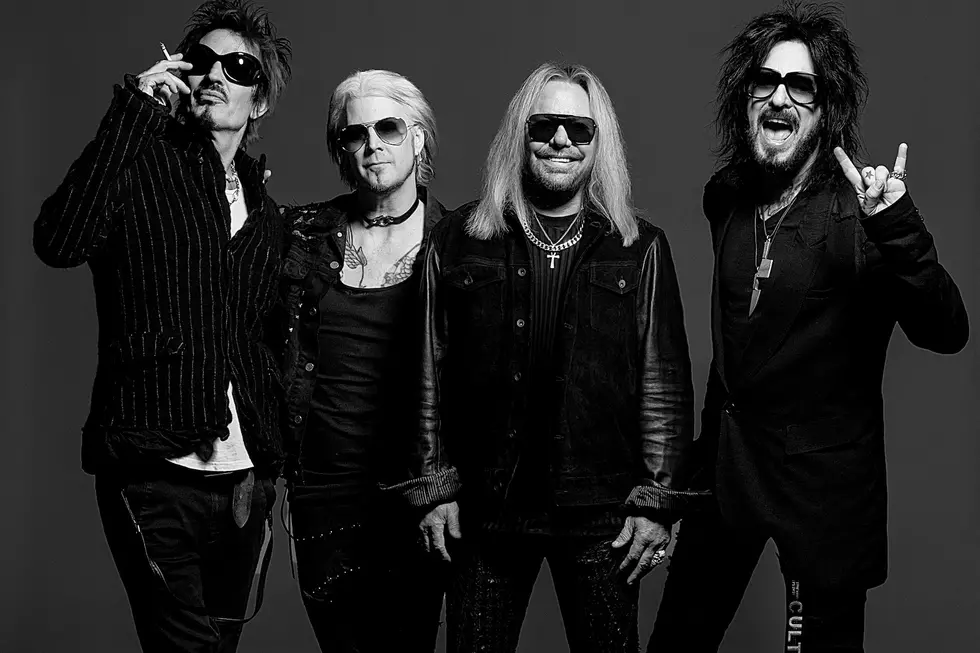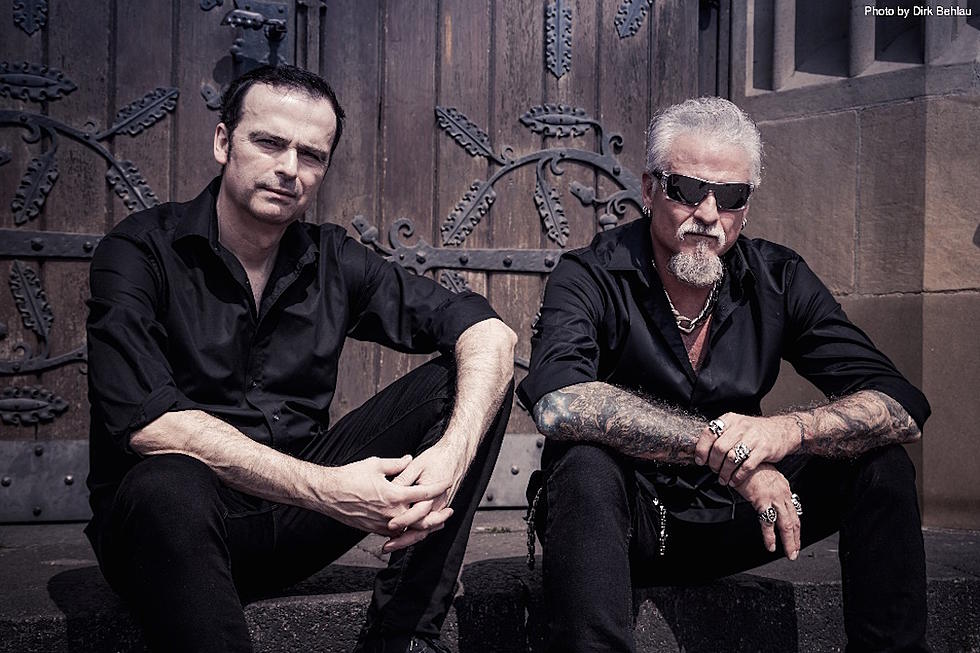
The 15-Year Wait for a New Demons & Wizards Album: What Else Happened?
It's been 15 years since Demons and Wizards, the collaborative group starring Iced Earth's Jon Schaffer and Blind Guardian's Hansi Kürsch, released a new record. III, their first album since issuing Touched By the Crimson King in 2005, is out now and when the two stopped by New York City, we dove into some of the major events in rock and metal that have taken place since we last heard from the group.
While both musicians have been incredibly active in their respective groups over the last 15 years, closing the gap between Demons & Wizards releases offered a chance for reflection on how much has changed. That amount of time can change musicians themselves and the way they write, making fans apprehensive about the high-pressure stakes of a comeback record. After one listen of III, it's evident that this duo's grip on their spellbinding heavy metal attack has not loosened a bit.
Looking back on 15 years, here's what Schaffer and Kürsch had to offer.
Jon, I'll let you kick this thing off. I know you've got one topic in mind that had a profound impact on all of us.
Jon Schaffer: Since our last album came out, the passing of Ronnie [James Dio] was obviously a big event for the whole metal community. I loved him so much — he was such a wonderful soul and I still get choked up.
Hansi Kürsch: Blind Guardian played with Heaven and Hell in 2007 a couple of times. I really enjoyed watching them and he was still in total control of everything he was doing.
He passed away and it was a fact you cannot avoid — it's part of your life. But, he still went far too early and I'm just wondering what he could have delivered with Heaven and Hell if he would have been still alive and that would have been the alternate to Black Sabbath reuniting with Ozzy Osbourne.
HK: Even things like these hologram shows they did prove how admired he had been.
JS: The response to his death shows how tight knit really the metal community actually is. If you're fortunate enough to be able to get to know some of these people, you learn who they really are. It just was an amazing outpouring.
HK: You can see how dedicated the fans are. He's not forgotten. We talk about him right now and that will be the case in 10 years from now. The king is not forgotten, that's for sure.
Heaven & Hell, "Neon Knights" (with "Country Girl" intro)
So let's go on to another big event — Black Sabbath retiring.
JS: That's bittersweet. I wish I could've seen that tour. The problem for us musicians is a lot of times we miss stuff because we're out touring, so that's kind of just the nature of the beast. It's very, very sad because it's making me feel old [laughs] because I've been a fan since I was three.
How did you feel about the Bill Ward situation? Do you think he should've been there?
JS: Yeah, I think so.
HK: I totally think so. I like 13 — Black Sabbath took the exit musically with a great album, but it would have been better with Bill Ward. That is with all the respect to the drummer [Brad Wilk] — he is a really amazing drummer. It's not up to me judge or decide who's going to play the drums, but Bill Ward is that '70s drummer — that jazzy guy.
JS: I don't know what if it was health or politics or whatever — it's not my issue, but if you're going to go out as Black Sabbath without Bill Ward, that's a bummer.
Black Sabbath, "Black Sabbath" — Live at Final Show
It's time to talk about Ghost, which has been maybe the most talked about new band since the last Demons & Wizards record came out. What was your reaction when you first heard the band?
HK: Jon, you recommended them to me when I visited you somewhere in Germany. You were playing a show and you said, "Did you hear about that band Ghost?" You showed me the videos and everything.
I have to say it's not my pair of shoes. It's too artificial for me. I like the attitude to a certain point. When you see them playing live, [Tobias Forge] doesn't even care if stuff comes from [backing] tape and it's just only a mic into the audience and the audience doesn't care anyway, so there is a change.
JS: For me, I like the first album a lot because I can hear the Blue Oyster Cult influence in the band. That's a band that I feel has contributed a whole lot to hard rock and heavy metal and doesn't really get the love. But Ghost also turned it into their own thing — I am into guys that can pull that the theatrical thing — I love to be entertained by it.
Ghost, "Ritual"
The later albums that they put out are a little poppy for me, but at the core, the dude's fucking talented — he's a visionary and he's made a difference, so I'm into it.
All you can do is take your influences which come not just from the bands you listen to, but your life and all of the events that happen in your life that is a direct reflection it's going to be of your music.
HK: But I don't hear that. The output has to be natural. This is like math almost — it's really calculated like, "Oh, I'm listening to Queen at the moment. This is a cool riff — I'll take that and that and switch it a little bit."
JS: That's a valid point. I just hear the authenticity, especially in the early stuff, of what they were going for. Those initial ideas sparked the whole thing.
I think Tobias Forge, to a certain degree, is writing for the stage, which is a different approach than a lot of metal musicians take. He's thinking about live shows because that's the industry model that he came into — live is the only business with album sales not being a huge factor.
HK: It's a different mindset thing because we do larger than life productions and we do larger than life music. My concern is always how to transfer that to stage and that sometimes is more difficult than I would have expected. But while doing the song, everything needs to be done to make that the best song possible. In that regard, though, it might be the opposite where they think about the biggest impact onstage.
JS: He's smart and I admire him. Whatever he's doing, it's working big time.
Another thing you wanted to discuss was the metal cruises, which have been one of the newest developments in the heavy metal circuit. It's been a lot of fun for the fans and just as much fun for the artists. What do you enjoy most about that experience?
HK: As musicians, the first time we played the 70,000 Tons of Metal cruise, that was a relieving moment because we were presented a new option. It was an experiment almost — you cannot escape and you have all these people around you. My expectations were you have to do a lot of talking whether you want to and sometimes someone can be a little overzealous, but this has never been the case. It was a very pleasant first experience.
Blind Guardian, "The Bard's Song" — Live at 70,000 Tons of Metal in 2011
JS: Iced Earth did the first 70,000 Tons of Metal cruise and I agree with that. People were totally cool and it was a whiskey fest for me. Fuck —I ended up with $1,000 Johnnie Walker bill at the end of that cruise, man. [laughs] It was an unbelievable party man. I didn't even know that these guys were on there. My team was running late to get to the ship and I was literally running down the fucking gangway, I jumped across and they're like, "Okay, we're sailing." They were waiting on me to get there [laughs].
Iced Earth, "Melancholy (Holy Martyr)" — Live at 70,000 Tons of Metal in 2011
Do you feel like you could be a little looser? Like, it's okay if you're a little drunk onstage and maybe you mess up here and there, but it's more about the atmosphere of the ship?
JS: You shouldn't look at it that way, but yes, it happens.
HK: It's a lose lose situation. I feel so embarrassed as a vocalist because I'm mumbling and I'm losing my words and I don't like that. These days when we play on these cruises, I always stay sober until after the show. You can have that attitude and basically if you play at 12 o'clock in the morning, no one cares. But in Iced Earth and Blind Guardian's case, we were the two headlining bands and it was a 90 minute show.
Being onstage for 90 minutes, I start feeling it in my liver. I'm not moving a lot onstage, but it's still very demanding on the body and then my organs really try to insult me for being an asshole. [laughs] So I'm taking really good care of myself now.
The last one we'll talk about is Queen with Adam Lambert and Paul Rodgers. You both come from different viewpoints on Queen there and there's also the new craze of biopics to dig into here.
JS: I'm not a big Queen fan, but I am a big Paul Rodgers fan. When I heard that he was going to be joining Queen for awhile, I was wondering how that was going to work. He's got such a rock and roll voice. I've got the live DVD and I thought it was actually pretty cool.
I've always appreciated the band, but it's just not something that grabbed me in my youth.
Queen + Paul Rodgers, "Fat Bottomed Girls"
HK: Apart from Deep Purple, Queen have had the biggest impact on me and on Blind Guardian. I'm a big Freddie Mercury fan and I really disliked the union with Paul Rodgers. There is no Queen without Freddie Mercury. I had my issues with the Paul Rodgers appearances, but I agree with Jon — it sounded fantastic. It was a perfect blend.
That just proved how closely related the rock stuff was to Free. I really liked that aspect and a lot of the songs really sounded like they were designed for a vocalist like Paul Rodgers. Freddie Mercury is on the very, very highest level, even higher than all the other vocalists we've spoken about, but Paul Rodgers is on par and if anyone deserves to sing with Queen, then it is him.
I was also disappointed about the Adam Lambert thing. I think he's a very good vocalist, but you know, I don't like that whole American Idol thing — all that artificial stuff is not good. Even though he reflects a character which can be similar to Freddie Mercury, Freddie Mercury is like Ronnie James Dio — he's so extraordinary in what he had done that you cannot copy him.
Thanks to Jon Schaffer and Hansi Kürsch for the interview. Get your copy of Demons and Wizards' new record, 'III,' here and follow the band on Facebook and Instagram.
The 66 Best Metal Albums of the Decade: 2010 - 2019
More From Loudwire


